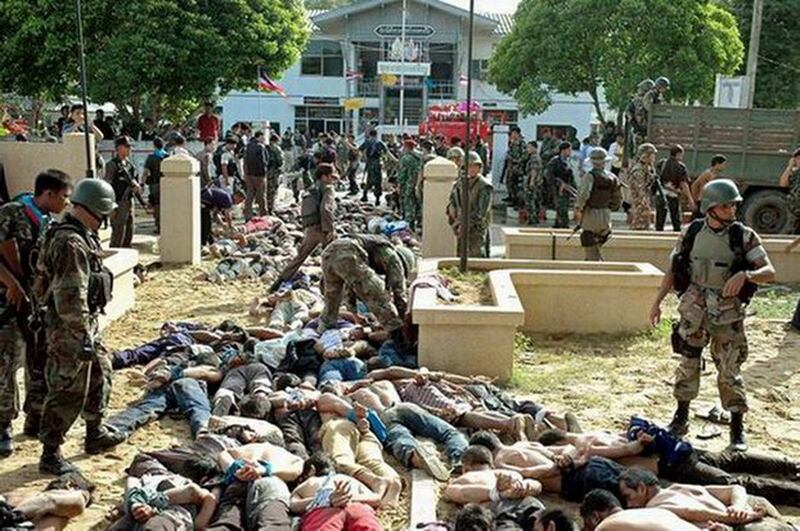Relatives of 85 people who died in the Tak Bai massacre said Friday they would not seek legal action against those responsible for the incident that helped re-ignite Thailand’s Deep South insurgency, despite calls for justice from a human rights activist.
Family members made the statement during the 15th anniversary of the massacre.
On Oct. 25, 2004, seven demonstrators were killed when authorities opened fire on a large crowd of protesters who had gathered at a playground near a police station demanding the release of six volunteer security guards who were accused of supplying southern rebels with stolen government-issued weapons.
Police and soldiers then rounded up and arrested protesters, stacking 1,370 face down with their hands bound behind their backs in military trucks. Officials said 78 people suffocated while they were being transported to a military camp 150 km (93.2 miles) away in Pattani province.
Yaena Salaemae, 60, whose husband was shot and killed and a son detained on that day, has led efforts to reach financial settlements totaling about 600 million baht ($21 million) with the government.
She told BenarNews that while the victims have five more years to pursue justice before reaching the statute of limitations, they have abandoned efforts to charge the officers involved.
“Everyone agrees on bringing an end to this because we do not have the resources to fight the state,” Yaena said during a memorial ceremony attended by about 100 in Narathiwat province.
In 2013 after years of negotiations, the survivors of those killed received 7.5 million baht ($210,000) while 51 who suffered injuries were paid 1 million to 4 million baht ($33,000-133,000) each.
Those detained, including 58 who were released two years later, received 30,000 baht ($994) in compensation.
Yaena said government officials asked the survivors to refrain from bringing charges against those on duty that day. Despite a government inquiry, no member of the Thai military or police has been prosecuted over the massacre.
Hayiding Maiseng, who received compensation after he was shot in the back, said he has not fully recovered from his injuries. The complexity of litigation forced him to give up efforts to bring charges even though he does not believe justice has been served.
“The litigation is too painful and difficult for villagers like me,” he said.

Call for justice
Angkhana Neelapaijit, a former National Human Rights commissioner, said the government should punish officers who were involved in the incident.
“On the 15th anniversary of the Tai Bai massacre, it is absolutely necessary for all parties to review the justice system to prevent this from reoccurring and bring justice to victims and their families,” said Angkhana, a recent recipient of the Ramon Magsaysay Awards, Asia’s highest honor.
“Bringing the case to court for hearings is not for revenge or to expose any person or organization, but to lead to full disclosure of the truth and to a culture of accountability,” she said. “It will end the culture of impunity and will lead to security and military reform.”
Meanwhile, Col. Pramote Prom-in, spokesman for the regional office of the Internal Security Operations Command, said outsiders should not get involved.
“All cases involving Tak Bai incident have already come to their conclusion. Justice has been served,” he told BenarNews. “Compensation has been made. Currently, only outsiders are trying to tell local people to launch legal battles.”
Nearly 7,000 people have been killed in the mainly Muslim and Malay-speaking Deep South since the separatist insurgency flared up in January 2004.
